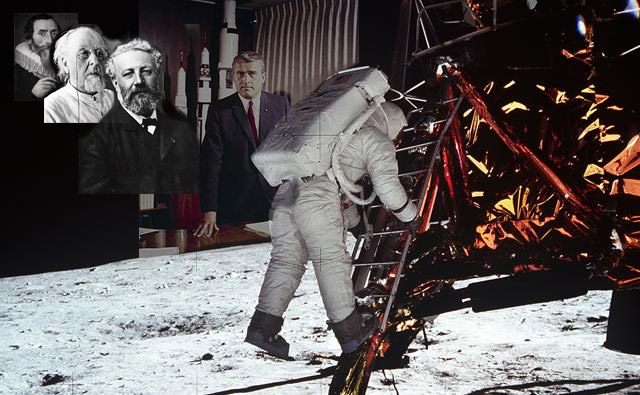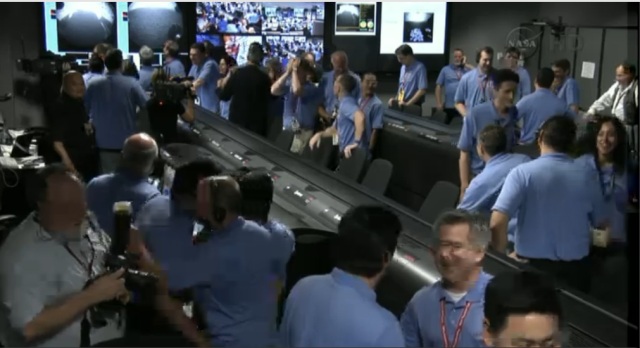
Science fiction and technology writer
Popular blog posts
Recent forum posts
Discussion Forum
Discussion forumShowing topics tagged as: Space
The job of a science fiction writer
Post #: 204
Post type: Blog post
Date: 2013-07-30 12:26:49.000
Author: Jeremy Reimer
Tags: Space, Science Fiction

As writers, it’s our job to inspire as well as entertain. But science fiction writers have an additional duty, and it’s a monumental one.
Some of the earliest science fiction writers were scientists. Johannes Kepler, who figured out the laws of planetary motion and thus paved the way for Isaac Newton and modern physics, wrote a short story in 1630 about a trip to the moon. It was called Somnium, Latin for “The Dream”, and it featured a young student traveling to the Moon. Some consider this work the very first science fiction story, for even though it featured supernatural elements, it treated the setting with scientific vigor. The traveler was affected by gravity and observed planetary motion as understood by Copernicus. Of course, in Kepler’s time there was no conceivable scientific way of actually getting to the Moon, but it was the dream that mattered. The dream wouldn’t go away.
In 1865, Jules Verne wrote a story called From the Earth to the Moon, which took the technological advances of the recent American Civil War and applied them to peaceful pursuits. While his idea for a massive cannon to launch space travelers wasn’t actually practical (the muzzle would have to be too long and the acceleration too great for human survival) he made an attempt to do some rough physics calculations to make the story seem plausible.
In 1903, Russian scientist Konstantin Tsiolkovsky published a refutation of the physics in the popular tale, and was inspired by the story to ask the question: if cannons wouldn’t work, what would? Out of this came the theory of rocketry: Tsiolkovsky calculated a relationship between the mass of a rocket, its fuel, and its velocity. At the time no foreign scientists appreciated his work, but a German translation of his book found its way to a young engineer by the name of Wernher Von Braun, who filled it with his own notes and calculations. After Germany’s defeat in World War II, Von Braun led the American team that finally landed a man on the moon in 1969.
This is only one example of science fiction influencing reality. Young men who watched Star Trek as boys would often go on to invent some of the things they saw on the television show: talking computers, portable communication devices, and hand-held electronic displays. While it may seem as if progress in space travel has slowed since men landed on the Moon, people like Elon Musk—who wrote science fiction-themed computer games as a kid—are now developing the beginning of commercial space travel with SpaceX. There is a direct line between imagining something is possible and making it possible.
You can’t go to space without the appropriate technology, but you don’t get the idea for the technology without science fiction. Instead of predicting the future, the goal for science fiction writers should be to invent it. How else are we going to get there?
Views: 7298
NASA Curiosity rover lands on Mars!
Post #: 124
Post type: Blog post
Date: 2012-08-05 22:52:16.000
Author: Jeremy Reimer
Tags: Space


Views: 6869
So who am I?
I'm a writer and programmer. I write science fiction stories and novels.
I am the writer for the upcoming documentary series Arcade Dreams.
I also write technology articles for Ars Technica.
I'm the creator of newLISP on Rockets, a web development framework and blog application.
- Email: jeremy.reimer@gmail.com
Topics
3D Modeling
About Me
Amiga
Articles
Audio
Blockchain
Blog
Blogs
Book Reviews
Book review
Comics
Computers
Computers Microhistory
Computing
Conventions
Crypto
Daily update
Entrepreneur
Family
Forum post
Gaming
Gaming Starcraft
Gaming metaverse
Internet
Jeremy Birthday
Kickstarter
Knotty Geeks
Knotty Geeks (video)
Market Share
Masters Trilogy
Monarch
Movies
My Non-Fiction
My Science Fiction
NewLISP Blog
Novels
OSY
Operating Systems
Pets
Poll
Reviews
Science Fiction
Servers
Software
Software Operating Systems
Space
Star Gamer
Star Trek
Starcraft
Television
Testing
Toys Childhood
Wedding Marriage
Work
Work Life
World
Writing
 RSS Feed for this blog
RSS Feed for this blog